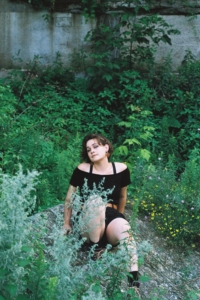Signs Of Spring / Who Made The World / Black Gold
Signs Of Spring
The chapped lips of last
season’s flora, the winter-cracked
cattails slowly recovering
their limber. Today I saw
a willow precisely
severed of many limbs
and thought, a fool,
of Venus de Milo
as though I could marble
and vein the heart
and sinew, as though
I could project my sense
of helplessness onto
a greening tree. Marooned
as a traffic cone set
upon a deepening puddle
of ice-melt. Somewhere near here
are gated cherubs, waiting
for water to spit
on stone seashells. Near
are robins chirping
their own industrial sounds,
unconcerned as they are
of this year’s sickness
rumbling on the horizon,
devising nests from the wig hair
you say comes back
and garlands the intersection
of Franklin and Nicollet
as a sign of spring.
I thought you could never
love me last year, I dreamed
of taking you to the rose garden
I dreamed, of you, bee-stung.
This is our first not-quite spring
together and perhaps in a week
or so we will be quarantined,
the blue fence so much more
blue, the lake-dark set to slow
boil, and a dream of us willowing
across the street.
Who Made The World
i.
My brother took us to a dam
on the reservation to test my lover’s
hiking skills and ability to put up with us.
An old man in denim overalls
greeted us beneath a metal bridge
and offered a basket of blueberries.
Fruit makes my lover blister
but my brother and I, greedy
as bear cubs, took handfuls,
little blue nights bursting
in our mouths. We ate
watermelon in the parks
even when hornets chased us,
we traded orange peels Saturday nights
as though a currency. We walk down
dry rivers with fish bones
crackling beneath our feet
and befriend garter snakes,
we skin berries with front teeth
just to see the veins of sweet
and tiny worlds. The plum trees
in our grandmother’s yard
were chopped down years ago.
ii.
I am sorry for the telescope mounting
itself atop Mauna Kea, I am sorry
for my golden, Hawaiian childhood
at the army barracks. My mother
displaced army wife with brown
shoulders, high ponytail and pink
scrunchie, a baby sleeping
at her hip, 19 years old. How do I account for this—
my hair was sun-bleached blonde,
the first words I spoke
were Spanish and Hawaiian.
I learned to swim in the Pacific
before Lake Superior
and I have grown up terrified
of bugs. I am sorry for this
happy time, but of all cruelties,
what I can’t get over is this—how
my little brother imagined
his stuffed dog gunshot
in the velvet leg, how I had grown out
of my kindness and refused
to bandage his paw.
iii.
I am astonished at the bridges built
to bring one body to another,
how many boats and shipping crates
it’s took for these peppers
this sausage to sizzle
in a cast-iron pan.
On the day of my best friend’s surgery,
I find a tomato plant growing
outside an auto shop
and sprinkle the bit of tobacco
dusting my pockets around it.
I am always leaving bits of dirt
and plant matter behind me.
I call the weather in for supper,
a thundercloud spills milk
over my finest linen. I prefer
this, dinner with my accomplices
in disaster, my gods.
Black Gold
After the Husky Oil Explosion
We used to come here
early mornings reeking
of Venus, of winter stars.
We were, he said, cowards
hiding our faces from distillation
towers, steaming throats
a hell-hot flute the ground
is forced to play. He fixed
cameras for the refinery,
straightened them like bowties
waiting for men to fall in oil
waiting for a dredging of ashes.
The day of the explosion I
was safe and far away from
home, watching the smut
plume above my sister’s house,
above my grandmother and brother,
all of us he failed to kill.
The love line of my palm
begins there, where
the river runs muddy
and smoke eats through lungs
like a moth unfurling her wings
over the body’s own.
My brother slept through
the fractured roar of tanks.
When we find good dreams
we stay.
Our father hoarded bombs
of blood money, plummeted
to the casinos. Some weeks
we didn’t have money for food
or heat or water and he’d extinguish
us, a fire in the dry lawn
attaching a hose to the neighbor’s spigot
like a parasitic worm. We
learned air is most bitter
on clear and sunny days.
We met our stubborn fires,
undousable.
The one thing I still trust
in this world is water, even
cruel water.
It can’t choose the hands
that try to hold it.
A doe was found felled
outside the refinery gates,
soot-smoked and out of bounds
to be considered a technical
causality. In the North Dakota
oil fields I hear the women
fare poorly, in their own
treaty-drawn bounds, oil workers
sneaking in and sniffing
for another earth-deep wet
to spoil. No reported
causalities, now the river tarred, whirlwind
of liability waivers sent downwind
the ruin. How do you divine in parts
per million.
How do I gentle the fire light,
eroding now at the river banks.
Halee Kirkwood is a descendant of the Fond du Lac Band of Lake Superior Ojibwe and earned their MFA from Hamline University. Their work has been published in Up The Staircase Quarterly, Muzzle Magazine, ctrl+v, Cream City Review, and others. Kirkwood is a 2019-2020 Loft Mentor Series Fellow, and was an inaugural teaching fellow for the 2019 Desert Nights, Rising Stars writing conference at Arizona State University. Their mini-chapbook, Exorcising The Catalogue, was published in Fall 2018 with Rinky Dink Press.





